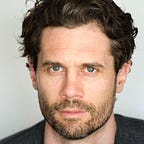What Sports and Writing Have in Common (More Than You Think)
“I write when I feel like it.”
This is a thing I often hear from beginning writers who come to Writers Blok, the co-writing community I founded in Los Angeles. When people say this, I nod. Even though on the inside, my eyes are wide, I’m backing away, and I’m mouthing these words:
OH NO
Because writing doesn’t work like that. I know this because I used to say same thing: “I write when I feel like it.”
I started writing because it felt good to tell people what was happening in my very odd life. I was a vagabond professional basketball player and no one knew what that was like. Writing was catharsis and therapy and belonging — an artistic turducken that carried with it the ancillary benefit of occasionally bringing others some measure of joy.
For years, I thought this was how writing worked: you wrote when you felt like it, you made people laugh (sometimes), and then Random House gave you a book deal.
This thinking was reinforced by the ACTUAL BOOK DEAL I was given. That book deal led to a real-life book, and that real-life book did pretty well, and so I thought I was right. I could wait around for some divine hand to goose me into action and then step up to the keyboard. But then I spent three years flailing away at a second book that eventually went into the trash and I realized I was wrong. Writing cannot be done “when we feel like it.” At least, not if we want that writing to be any good — a lot like something else I once knew something about: being a professional athlete.
In the past five years, I’ve come to understand that writing is almost exactly like sports. To get good at it, you have to practice. And practice doesn’t just happen “when we feel like it.” It happens every day, whether we slept well or had a nice breakfast or spent the night in the bedroom of someone we shouldn’t have.
To some people, that sounds pretty terrible.
“You mean, it’s not easy?!”
No, no it is not. In fact, sometimes, it is drudgery. The rewards, though, are immense. I don’t mean Pulitzers and Oscars and Tonys, necessarily. I mean finding a routine and sticking to it. I mean satisfaction in a job well done. I mean thinking less about the big project, and more about the small one. Along the way, you’ll probably finish some stories, write some screenplays, and get done what you set out to do.
You might even get a book deal from Random House.
Here are three things to help you get started:
1. Commit to a certain (smallish) amount of time, and commit to doing it (almost) every day.
I write for one hour every day, six days a week. No more, no less. To some “writers,” this doesn’t sound like much. But here’s what I know: I started in on this schedule five years ago, and in those five years, I’ve produced one finished book (Stories I Tell On Dates), four drafts of my next book, and three drafts of the one that comes after.
2. Stop when you say you’ll stop.
It is tempting, especially for beginning writers, to think they need to write more when they’re on a creative hot streak.
RESIST THIS TEMPTATION
If you said you were going to write for a thirty minutes, stop at thirty minutes. This is important because you made a deal with your brain, and that deal made it easier to get started. If you go back on that deal, your brain will not trust you tomorrow. Tomorrow, it will say, “Yeah, you said thirty minutes yesterday, and it turned into three hours. We’re going back to bed.”
3. Figure out a warm-up, and figure out a reward.
In my basketball days, I would never have driven to the gym and then gone straight into 360 slam dunks, in part because I could never pull off a 360 slam dunk (I’m a white kid from Kansas) but also because I would have blown out an Achilles if I hadn’t warmed up first.
When it comes to writing, I don’t mean that you should diagram a sentence to get going; I mean that you should give your brain some padding. For me, this is as simple as putting on a song I love — something that makes me happy to be alive. Then, when I’m done, it means putting on another song I love and taking a moment to enjoy that I did what I set out to do: I wrote for my hour. And if I put enough of those hours together, I will produce something good.
So will you.
Paul Shirley is the author of two books and countless essays and articles. He founded Writers Blok in Los Angeles to help writers find structure and community. To learn more, visit the Writers Blok website.
